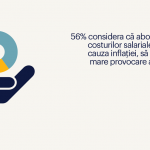Randstad Romania HR Trends 2023 research

More than half of employers willing to raise salaries to keep their workforce, while most hirings will be in IT&C, manufacturing and FMGC this year
13% of companies plan to test the 4-days working week
- Unrealistic salary expectations is the most frequent obstacle when recruiting for about 90% of Romanian leaders,
- Traditional marketing/ communications and sales, the departments in which respondents find it hardest to hire,
- Over 80% find a 4-day work week impossible to manage,
- To deal with a recession, 73% of companies would choose a hiring freeze,
- 46% of respondents expect their sales volume to increase in 2023, and 15% feel challenged by the extraordinary increase of the business.
Over 70% of the Romanian leaders estimate the salaries in their company to be the same as their competitors’, while they are willing to raise salaries to keep their workforce, according with Randstad Romania HR Trends 2023 research. The report is dedicated to delivering insights into how companies are adapting to the current economic context, what are the challenges they are facing and how do they plan to deal with them in the following year.
Top business challenges in 2023
Regarding the sales volume of their products or services in 2023, 46% of respondents expect them to increase, 29% estimate they will remain stable, and 9% expect a decrease. Dealing with the increased wage cost due to inflation seems to be the biggest business challenge for more than half of Romanian leaders, followed by dealing with the higher cost of (doing) business due to inflation (55%), and loss of candidates due to wage inflation (44%). Romania leaders also are challenged by:
– managing high energy costs – 36%,
– managing unexpected costs – 30%,
– keeping the business operational – 22%,
– maintaining relationship with clients and/or suppliers – 20%,
– maintaining trade margins – 19%,
– increasing digital security – 17%,
– ensuring processes and guaranteeing productivity – 16%,
– dealing with an extraordinary increase in business – 15%.
To face a recession, 73% of the respondents said their company would choose a hiring freeze. Other interesting options in such a scenario are build-up employee skills, adjust products and services – offering only the cost-efficient ones, raise prices, reduce the compensation & benefits packages, energy efficiency investments, shorter schedule / shifts, or offer more work from home days (decrease office energy costs).
Main trends regarding workforce and salary this year
The main trend among candidates, that transforms into a major impediment in recruiting, consists of workforce high expectations regarding the salary, as people are striving more and more to achieve a better quality of life. According with Randstad HR Trends 2023 report, unrealistic salary expectations is the most frequent obstacle when recruiting for about 90% of Romanian leaders, who also encounter difficulties in finding candidates with the necessary industry working experience.
As far as hiring plans for 2023 are concerned, this year 33% of respondents expect a headcount increase, 50% will not hire this year, and 6% anticipate a headcount decrease. IT&C, Manufacturing and FMCG are the sectors that require the most hiring volume will take place. About half of the participant companies that have open positions this year state they need to hire new employees due to the business growth. Among other significant reasons, there are the need for new skills in the organisation, business diversification, or staff turnover. Most companies are looking for candidates in the sales or IT departments. Traditional marketing/communications, sales and procurement are the departments in which respondents find it hardest to hire.
In 2023, people engagement raises as the main challenge of HR management. Randstad HR Trends 2023 identifies the following aspects companies regard as workforce challenges this year:
- keeping employees engaged – 63%,
- attracting talent – 62%,
- managing expectations on compensations and benefits – 58%,
- retaining top performers and developing talented leaders – 57%,
- managing high turnover – 32%,
- employer branding – 32%,
- shortage of local talent – 32%,
- managing skill shortage – 31%,
- onboarding new employees – 29%,
- ensuring employees’ mental health – 21%,
- aligning flexible working-hours with the business needs – 13%.
Training programs is the measure most of the respondent companies are willing to implement in order to manage the above human resources challenges they encounter (76%), followed by salary improvement (57%), more flexible work options to employees (37%), personalised benefits pack (33%), hire talent from other countries (24%), increase use of externally hired contractors (15%), outsource business functions (6%) and hire more part-time workers (4%).
The labour market is being dominated by flexible work, either hybrid or fully remote. 82% of respondents find a 4-day work week impossible to manage, only 3% plan to implement it to help their employees improve their work-life balance, and 13% plan to test it.
About Randstad
Randstad is the world’s largest talent management company and a long-term partner of its customers. We are committed to providing equal opportunities for people from diverse backgrounds and helping them stay relevant in the rapidly changing world of work. We have a deep understanding of the labor market, which is why we can help our clients develop the high-quality, diverse and agile workforce they need to succeed. Our 46,000 employees worldwide make a positive impact on society by helping people realize their true potential. In 2022, we helped more than 2 million people in our 39 markets find a job they feel good about.
Randstad is present in Romania with two branches, in Bucharest and Slatina, Olt County. We have been contributing to the evolution of the labor market in Romania for over 13 years. Since 2016, we are part of the Randstad group, combining internationally demonstrated expertise with a successful local team. We believe that true connections are not made only through data and algorithms. They also require empathy, communication and instinct. Human instinct. In a technological world, it is the human footprint that makes the difference. For more information, see www.randstad.ro/.













